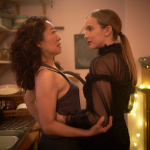In an age where it is becoming increasingly hard to disappear, the significance of forgetting is more prone than ever. Recordings serve as memories, reminders, evidence even. Now that we can, we do our best to immortalize our lives, since if anything is certain for those alive, it is death. Even if we fear fading away, intrinsically, we know full well that going against it is a losing fight. Nothing will last, not our lives, not our thoughts, not even our love. So what actually lies behind the need to record?
We love to record. Whether it is a video for a TikTok challenge, a family photo to frame, journaling in your diary, or just the weird sounds your dog is making. No matter if it is to be sent and received or just to collect pixel dust in your smartphone gallery. And surely, everyone at one point questions this urge to manifest every little thing. There might be a little voice judging you inside: Shouldn’t I just enjoy this moment? Right before you quash that thought and go back to click on that damn button.
In an Age of Constant Recording
In the past, people probably had fewer problems like this. Taking a photograph used to be more of a fuss, but today, it doesn’t take more than the touch of a finger. And we record literally everything; our outfits, our pets, our babies, our lunches, a funny-looking stain, museum tours, concerts, our friends’ house parties, birthday dinners – it would be much harder to list things people do not feel the need to record.
Since humans are natural collectors and hoarders, it makes sense that we feel the urge to capture the moment, especially now that it’s so easy to do. But do we really benefit from this?
Consequences of Image Overload
One of the key reasons for recording might be the goal to not lose the moment, to not forget, but it kind of backfires. Parents who take tons of photographs to document their kid’s childhood often pay less attention to the moment, as they are focused on the act of taking a pic.
This is called the photo-taking impairment effect, the phenomenon that taking photographs of objects makes you retain them and their details less because you rely on the camera for remembering. “It’s as if you outsourced your memory”, psychologist Linda Henkel states.
A simultaneous main factor for excessive recording might be that analog film cameras, polaroid, and disposable cameras are experiencing a revival. Next to the nostalgic feel and touch, there is also the awareness of the photographs being limited, making the process and subsequent physical manifestation of memory more valuable.
And the way we take photographs also matters. In a more recent study, there seems to be a connection between the impairment effect and the reason behind taking a photo. If we take a photo primarily to show off to others later, we will pay less attention to the object in focus than if we take it purely for our own enjoyment.
While this may be different depending on the type of media, you could argue that recording more means experiencing less. Or in the words of Vincent Moon, a French nomadic filmmaker: “In an era saturated by images, what’s the point of it? Where do we go with it?”.
The Meaning of Recording in Nomadic Filmmaking
Moon gained fame through founding and working many years for La Blogothéque, a series on independent music in short clips, so-called ‘Take-Away-Shows’ of musicians’ performances in intimate settings. Locations included cafés, elevators, and showers. The aim is to show acoustic music in its essence, stripped down from any industrial productions.
Another aspect important to Vincent in his recordings is that they are available for free, a kind of anti-capitalist approach that shines through his lifestyle too. After leaving the Take-Away-Shows, he followed through with the idea of nomadic cinema, particularly on puzzling technologies and the road together. It resulted in a five-year journey where he documented musical traditions in cultures all around the globe, showcasing wildly different musicians from extremely varied backgrounds. He did all that without a company or any other representation but with a backpack on his shoulders, the verbal promise of free video footage for accommodation and food, and of course, a musical performance to record.
The question remains still, why did Vincent Moon feel the need to do this? To put it in a nutshell, he claims:
“I would [give the recordings] to the people and let them do what they want with it. I just want to portray them in a beautiful light. I just want to portray them so that their grandchildren are going to look at their grandfather, and they’re gonna be like: Whoa. My grandfather is as cool as Beyoncé.
It’s really important because that’s the way people are going to look differently at their own culture, at their own land. They’re going to think about it differently. It may be a way to maintain certain diversity.”
For Vincent, recordings might be the way to sustain and preserve our lives. He often quotes Peter Lamborn Wilson (also known as Hakim Bey) who claimed that “every recording is a tombstone of a life’s performance.” From a more extreme perspective, to truly appreciate the moment, like Peter did with live music, getting rid of recordings and record players entirely is a way of giving the art the attention it deserves.
While that move is quite drastic, it touches upon an important point: The appreciation of art and culture, especially ancient traditions, cannot be kept alive through purely archiving them. Cultural preservation cannot rely on recordings but demands adaptation and dialogue.
How Can We Remember Honorably
There are many mecidiyeköy escort concepts as to how technology influences memory and its preservation. The Black Mirror episode ‘The Entire History Of You’ details the horrors of being able to recall every moment of your life, stored in your head as video recordings.
Peter also calls cyberspace a black hole of memory, thanks to digital tools acting as “prosthetic memory”, rendering ‘remembering’ as individuals, and therefore the creation of personal memories, obsolete. We don’t need to recollect anything anymore – so we don’t even try, something he describes as worse than forgetting.
Even if we see recordings as a simple way to improve our memory, relying purely on our own recollections of events is equally questionable. Memories are never as authentic or real as we tend to believe. Essentially, they are stories we write ourselves, ultimately built and molded into personalized shapes, quite a demanding and imaginative act.
But still, “memories are the only way our lives can continue to exist after death”, according to Korean photographer Chanho Park who is known for his photo series on funeral rituals. We are not remembered in objects, recordings, or anything tangible – after we are rid of our physical form, we continue to exist in the minds of others.
Recordings may then be used to correct memories, and therefore the past. If modern society operates without a sense of the past, although everything is rooted in it, then we are condemned to repeat it – a known quote by George Santayana. Not knowing our past leads to inventing it. But that might be unpreventable.
The Inevitability of Loss
Judith Schalansky could claim to be the literary expert on this matter, the German author is known for exploring objects that have not stood the test of time, things that have vanished.
She claims that while forgetting is distressing, not forgetting anything is worse. Knowledge is created through selecting certain memories to retain, instead of saving every little detail – that would take away their meaning, becoming a mass of unusable information instead. To put it simply, it’s okay to let go of some things.
In “An Inventory of Losses”, Judith describes being alive as experiencing loss. Because in the end, everything that exists is simply what’s been left behind. The ultimate downfall of life and creation is kind of its requirement to exist in the first place.
Adding to that, she argues that the world only grieves what it knows. We might be lucky to not know about all the great things that have been lost in history. Only the things we value as worthy can be mourned, only the things that we truly miss. That is probably why, to control the future, you must have a hold of the past.
Or to put it more harshly as Judith did, you must get rid of the past to steer the future. Often, the first act of a new ruling system is to unhinge the past. Regardless of whether that is dissolving agreements, demolishing monuments, or modifying fundamental laws.
A well-known quote claims that history is written by its winners – Theodor Lessing further describes history as giving sense to something senseless. Anything in history showing a reasonable and continuous order of events is the result of modifications in retrospect. As I have noticed before about humanity’s perspective of kindness, much of history is nothing other than stories with a beginning and an end, following narrative rules, while reality and nature exist through complex interactions between coincidences and adaptations.
The only use the past offers is being inferior in light of the future, if in context of one’s own life, a whole nation, or our entire human history. No wonder it is being exploited and with it the collective knowledge of society.
While the external world could vanish unfairly, our inner world can be shaped and therefore retained through what we choose to preserve.
I interpret from this that we can only suffer or derive joy from the memories we can still remember. If we have no idea what could ail us, it cannot cause us pain, elsewhere described as being blissfully unaware. Meaning we have certain controls over our emotional experiences. While the external world could vanish unfairly, our inner world can be shaped and therefore retained through what we choose to preserve.
We Choose How to Remember Today
And currently, we are all experiencing loss actively. Whether it is the loss of income, the loss of possible connections, or the loss of loved ones through the pandemic. The year(s) of blur made us aware of how much we are missing as physical proximity and intimacy become impossible.
The time during a pandemic has a history of not being remembered well, so what we take from this time for the future wholly depends on ourselves. On a grander scale, thinking of biodiversity, cultural sustainability, and even early dementia – there is not only a personal, but also a political urgency to the question of what deserves to be preserved, and how our collective memory affects all of it.
The debate on what is worth preserving has been around for decades. Preservationists see themselves as society’s conscience, journalist Debra Galant claimed in 1997, with a sacred mission of “saving the relics of the past before they are lost forever.” For Chanho Park, photography has healing powers, relating it to a tool that makes us able to face trauma with, to heal, and to cure with. Judith writes not to bring anything back, but to enable everything to be experienced. And the main motivation in filmmaking for Vincent is the unknown element of it, and the effect of his recordings on others, as he believes cinema teaches us to see.
More concretely, he argues that “the way we show the world is going to change the way we see the world”. But we live in the era of fake news, face filters, and other oversimplifications as well as spectacularizations of everyday life. Recording, therefore, should “aim to regain a certain complexity. To reinvent life today, we have to make new forms of images.”
What we understand as a loss, depends on what we value as worth mourning over.
In summary, we record, or we should record, in order to preserve what is precious to us. It won’t bring back the past, but it is the way we decide what is worth losing, for ourselves and those around us. What we understand as a loss, depends on what we value as worth mourning over. Values that come from our past are constantly reshaped through the present while also concurrently being influenced by our understanding of the past.
The next time you feel the compulsion to take out your smartphone, camera, or notepad, think of the deeper-seated meanings and consequences behind those actions. Now, how would you like to curate your memories; which moments should honor the remembrance of your own self and others, which are to be ignored as acceptable losses – and what will you record?
Cover: Cindy Zheng
Edited by: Pritha Ray




